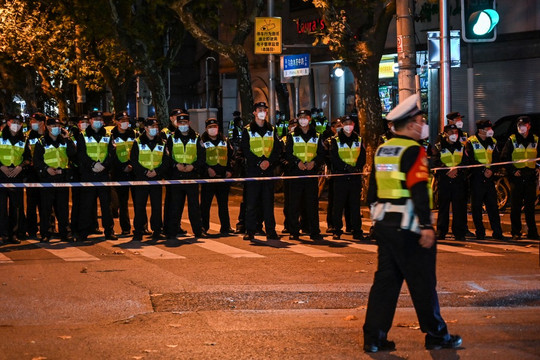On November 27, BBC correspondent Ed Lawrence was reporting on anti-lockdown protests in Shanghai when he was arrested, handcuffed and assaulted by Chinese police. In an official statement, the BBC confirmed that Lawrence was released after several hours, and raised concerns over the attack and arrest of an accredited journalist.
In a video circulated online, Lawrence is seen being handcuffed by at least five police officers and forcefully escorted down a street by an unmasked policeman as he calls for his associate to contact the British Consulate. Lawrence alleges he was kicked during his arrest. Chinese officials claimed the arrest was in Lawrence’s interest, as it reduced his risk of contracting COVID-19 from the crowd of protestors.
Chinese foreign ministry spokesman, Zhao Lijian, said, “According to our understanding, the BBC’s statement is not true. According to authorities in Shanghai the journalist in question did not reveal his journalist identity at the time, he did not openly show his foreign press card.”
Swiss RTS reporter Micheal Peuker was also briefly arrested. In a statement posted to social media, Peuker said he and an RTS cameraman were briefly stopped by police at the conclusion of their live broadcast, with officers taking their identification and briefly confiscating their equipment. After a brief negotiation, the two media workers were permitted to leave police custody and had their equipment returned.
The journalists were covering nationwide protests against China’s Zero-COVID mitigation strategy with demonstrators opposing stringent mandatory testing regulations and lockdown procedures. Some protestors have reportedly called for an end to widespread censorship and repression of the press. Observers say the scale of the anti-lockdown protests has not been seen since the 1989 Tiananmen Square student demonstrations.
The IFJ has been monitoring China’s rising global media presence since 2008. The IFJ’s recent report, The Story That Won’t Be Silenced: Hong Kong Freedom of Expression Report details the destruction of independent journalism and the collapse of press freedom in Hong Kong under Beijing’s National Security Law.
Michelle Stanistreet, NUJ general secretary, said:“The arrests and detention of Ed and Michael are sadly all too familiar to journalists reporting in China. Without a commitment from the Chinese government for journalists to be respected, attacks against those reporting on issues including COVID-19 and beyond, will remain commonplace. The NUJ will continue to work closely with the IFJ and sister unions to do all it can to support colleagues and stand in solidarity, opposing restrictions in China that continue to threaten press freedom.”
The IFJ said: “The targeting of foreign journalists for reporting on issues in the public interest is yet another serious attack on press freedom in China, where media workers frequently fall victim to violence, detainment, and harassment from authorities. The IFJ condemns the detention of Michael Peuker and the arrest and assault of Edward Lawrence and urges the Chinese government and police to ensure the safety and security of all journalists.”

